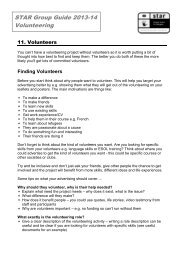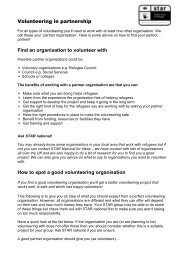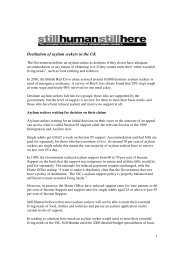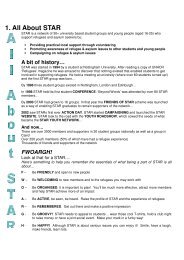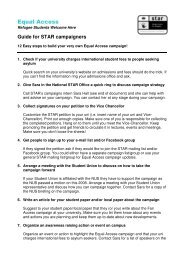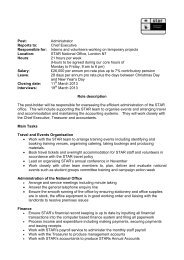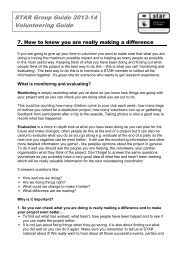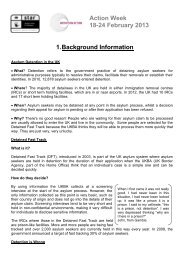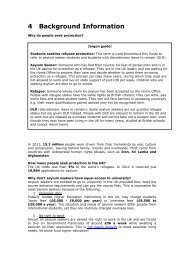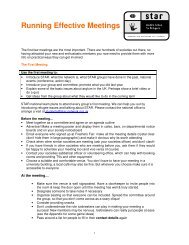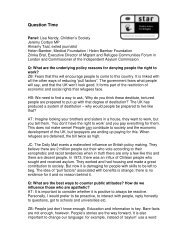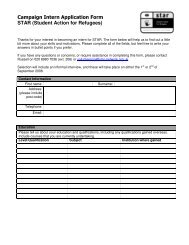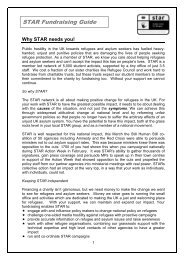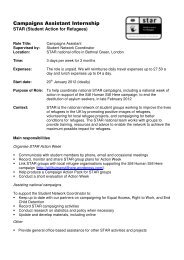Running a STAR group - Student Action for Refugees
Running a STAR group - Student Action for Refugees
Running a STAR group - Student Action for Refugees
Create successful ePaper yourself
Turn your PDF publications into a flip-book with our unique Google optimized e-Paper software.
Effective Meetings<br />
Meetings are the most effective way <strong>for</strong> <strong>group</strong>s to plan their work. They allow <strong>for</strong><br />
discussion, clear communication and an opportunity to build strong relationships in the<br />
<strong>group</strong>. Planning how your <strong>group</strong> will use meetings and conducting them in the right way is<br />
key <strong>for</strong> your <strong>STAR</strong> <strong>group</strong> to operate successfully during the year.<br />
There are different varieties you can have, from general meetings open to everyone to<br />
smaller sub-<strong>group</strong> meetings <strong>for</strong> particular purposes. We’ll focus here on some basic points<br />
to keep in mind when planning your <strong>group</strong>s ‘general meetings’.<br />
General Meetings<br />
Be<strong>for</strong>e the meeting…<br />
Regular time. Try to pick a regular meeting time (e.g. every two weeks, Tuesday<br />
6pm), as this will allow members to plan their time and do their best to attend.<br />
Check when other similar societies are meeting (ask your societies officer) and<br />
don’t clash!<br />
Book a room. If there are important topics to be discussed and decisions made<br />
with large numbers of people, then you’ll need a quiet room of an appropriate size<br />
to ensure discussions can be heard and everyone is com<strong>for</strong>table. Do this in<br />
advance so you’re not stuck without a meeting place. If it’s a smaller meeting on<br />
more in<strong>for</strong>mal topics, then you can always find a local cafe. But wherever you<br />
choose make sure it is accessible to everyone.<br />
Agree an agenda. Initially this will need to be done by the committee, so meet<br />
together in advance and agree on the main topics on discussion. In future, the<br />
outline of the agenda can be agreed at the end of the previous meeting, or a<br />
suggested outline circulated by email giving people an opportunity to add items, or<br />
just pass a paper round at the beginning of the meeting.<br />
Email meeting details. Including:<br />
o Date, time, location (nice and clear, don’t hide them in large paragraphs!)<br />
o Agenda<br />
At the meeting…<br />
Signpost the room. Make sure people can find your room and have a doorkeeper<br />
at the beginning to invite people into the room and keep the door open until the<br />
meeting has truly started.<br />
Organise seating. Set up the room to suit the meeting style. Let everyone be<br />
included if you’re having discussions, and spread the committee around the <strong>group</strong><br />
so that you don’t come across as a scary clique!<br />
Appoint a Chair / facilitator. This can be done be<strong>for</strong>e hand by the committee, or<br />
agreed at each meeting. But it’s important that someone takes responsibility <strong>for</strong> the<br />
following:<br />
o Introducing the meeting and welcoming everyone<br />
o Keeping time<br />
o Ensuring each agenda item is discussed<br />
o Allowing everyone the opportunity to contribute<br />
o Discussions stays on topic<br />
o Everyone is clear on the decision made and action points agreed<br />
Appoint note-taker if appropriate. Agree <strong>for</strong> someone to take the minutes and<br />
www.star-network.org.uk 4



